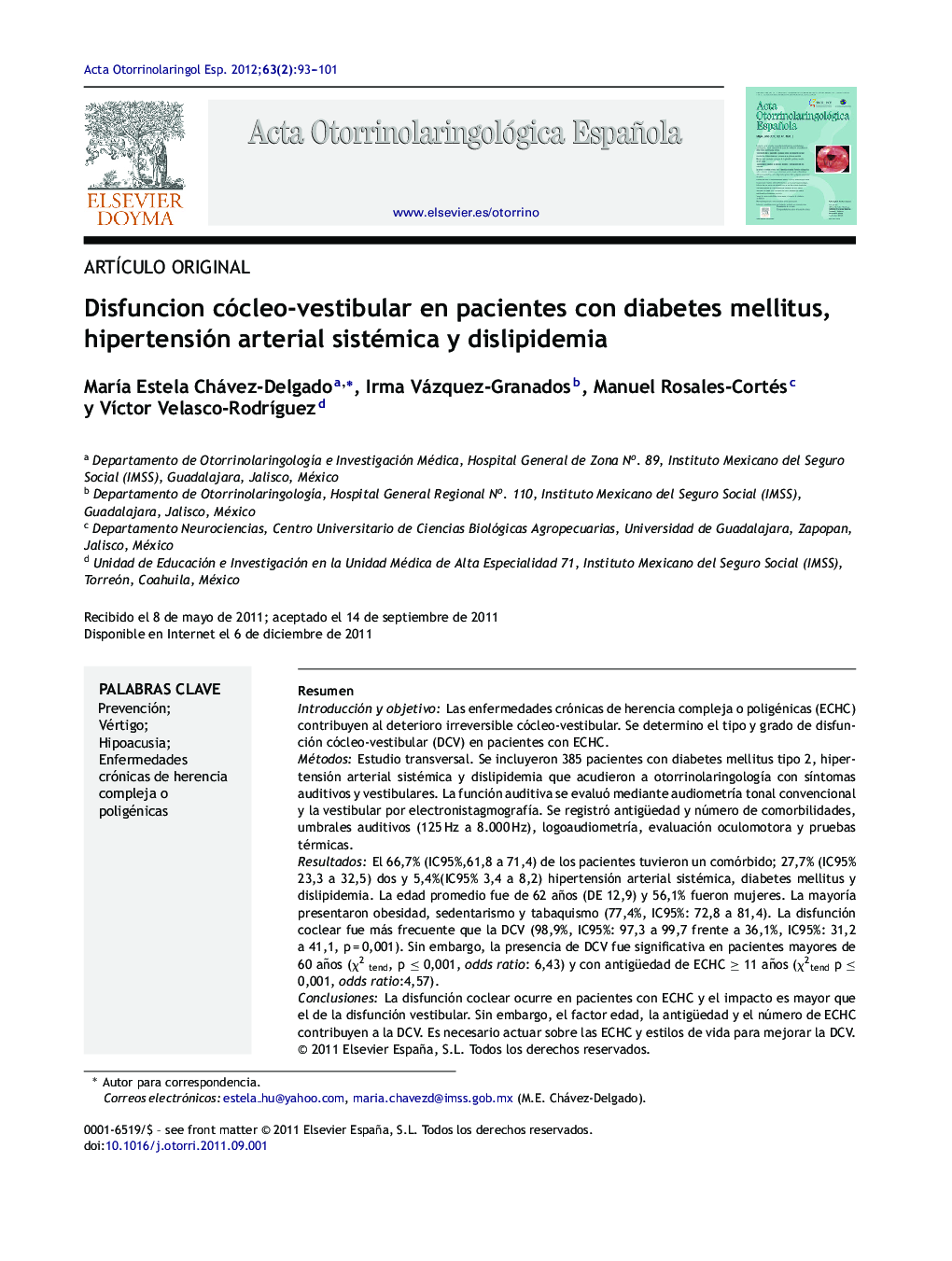| Article ID | Journal | Published Year | Pages | File Type |
|---|---|---|---|---|
| 4101988 | Acta Otorrinolaringológica Española | 2012 | 9 Pages |
ResumenIntroducción y objetivoLas enfermedades crónicas de herencia compleja o poligénicas (ECHC) contribuyen al deterioro irreversible cócleo-vestibular. Se determino el tipo y grado de disfunción cócleo-vestibular (DCV) en pacientes con ECHC.MétodosEstudio transversal. Se incluyeron 385 pacientes con diabetes mellitus tipo 2, hipertensión arterial sistémica y dislipidemia que acudieron a otorrinolaringología con síntomas auditivos y vestibulares. La función auditiva se evaluó mediante audiometría tonal convencional y la vestibular por electronistagmografía. Se registró antigüedad y número de comorbilidades, umbrales auditivos (125 Hz a 8.000 Hz), logoaudiometría, evaluación oculomotora y pruebas térmicas.ResultadosEl 66,7% (IC95%,61,8 a 71,4) de los pacientes tuvieron un comórbido; 27,7% (IC95% 23,3 a 32,5) dos y 5,4%(IC95% 3,4 a 8,2) hipertensión arterial sistémica, diabetes mellitus y dislipidemia. La edad promedio fue de 62 años (DE 12,9) y 56,1% fueron mujeres. La mayoría presentaron obesidad, sedentarismo y tabaquismo (77,4%, IC95%: 72,8 a 81,4). La disfunción coclear fue más frecuente que la DCV (98,9%, IC95%: 97,3 a 99,7 frente a 36,1%, IC95%: 31,2 a 41,1, p = 0,001). Sin embargo, la presencia de DCV fue significativa en pacientes mayores de 60 años (χ2tend, p ≤ 0,001, odds ratio: 6,43) y con antigüedad de ECHC ≥ 11 años (χ2tend p ≤ 0,001, odds ratio:4,57).ConclusionesLa disfunción coclear ocurre en pacientes con ECHC y el impacto es mayor que el de la disfunción vestibular. Sin embargo, el factor edad, la antigüedad y el número de ECHC contribuyen a la DCV. Es necesario actuar sobre las ECHC y estilos de vida para mejorar la DCV.
Introduction and objectivePolygenic or multifactorial inheritance of chronic disorders (MICD) contribute to irreversible cochleovestibular impairment. Our aim was to determine the type and degree of cochleovestibular dysfunction (CVD) in patients with MICD.MethodsCross-sectional. We studied 385 patients with type 2 diabetes mellitus, systemic arterial hypertension and dyslipidemia who were referred to Otorhinolaryngology Unit with hearing and vestibular symptoms. The auditory function was evaluated using conventional tonal audiometry and the vestibular function by electronystagmography. Duration of the disease and number of comorbidities, hearing thresholds at 125-8000 Hz pure tones, speech audiometry, oculomotor evaluation and thermal caloric tests were also analysed.ResultsA total of 66.7% (95% CI, 61.8-73.4) of patients had 1 comorbidity; 27.7% (95% CI, 23.3-32.5) had 2 and 5.4% (95% CI, 3.4-8.2) had systemic arterial hypertension, diabetes mellitus and dyslipidemia. The mean age was 62 years (SD 12.9) and 57.1% were women. The majority showed obesity, physical inactivity and smoking (77.4%; 95% CI, 72.8-81.4). Cochlear dysfunction was more common than CVD (98.9%; 95% CI, 97.3-99.7 versus 36.1%; 95%CI, 31.2-41.1; P=.001). However, the presence of CVD was significant in patients over 60 years (χ2tend, P≤.001, odds ratio: 6.43) and with MICD ≥11 years old (χ2tend, P≤.001, odds ratio: 4.57).ConclusionsCochlear dysfunction occurs in patients with MICD and the impact is greater than that of vestibular dysfunction. However, the age factor, duration and number of MICDs contribute to CVD. It is necessary to act on the MICDs and lifestyles to improve CVD.
